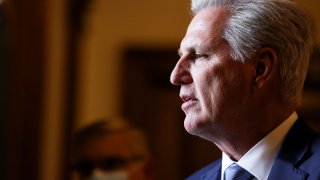
- House Republicans introduced a 5-year, $400 billion transportation bill that directs historic levels of funding to highways, bridges and transit systems.
- The reauthorization bill comes as the White House and Senate Republicans are negotiating a bigger, standalone infrastructure package.
- The House GOP plan excludes several kinds of infrastructure that the plans of both the Democrats and the Senate Republicans address, such as rural broadband, mass transit and airports.
WASHINGTON — House Republicans introduced a 5-year, $400 billion transportation bill on Wednesday that directs historic levels of funding to highways, bridges and transit systems.
The bill comes amid ongoing talks this week between the White House and Senate Republicans over their competing infrastructure plans.
The bill unveiled on Wednesday represents a potential third option for infrastructure funding, one that's more narrowly focused than either the White House plan or the Senate Republicans' plan.
Get top local stories in Southern California delivered to you every morning. Sign up for NBC LA's News Headlines newsletter.
"Our bill focuses on the core infrastructure that helps move people and goods through our communities every single day, cuts red tape that holds up project construction, and gets resources into the hands of our states and locals with as few strings attached as possible," said Rep. Sam Graves, of Missouri, the ranking member of the House Committee on Transportation and Infrastructure and a lead sponsor of the bill.
Unlike the proposals currently on the table from the White House and Senate Republicans, Graves' bill is not a piece of standalone legislation. Rather it is a reauthorization of the current five-year transportation funding bill, which expires on Sept. 30.
Money Report
Graves' legislation, known as the Surface Transportation Advanced through Reform, Technology & Efficient Review Act, or STARTER Act, would increase the money for surface transportation projects by a third, or about $100 billion.
But it would not address several other elements of infrastructure that the standalone plans of both the Democrats and the Senate Republicans address, such as broadband, mass transit, water projects and airports.
Beyond those, Biden's plan would also include billions more to fund research and development, schools and electric-vehicle charging stations.
The House Republicans' plan also proposes spending much less than Biden's proposal, the $2.3 trillion American Jobs Plan, or the Senate Republicans' counteroffer, which comes in at around $570 billion.
"As the process for considering legislation on infrastructure moves forward, I am eager to see these proposals become part of a robust bipartisan effort — just as the President continues to call for," said Graves.
Biden has said he wants to reach a compromise agreement with Republicans on infrastructure. To do that, he appears to be willing to bundle the "hard infrastructure" elements of his American Jobs Plan into a separate bill if that means it could pass with bipartisan support.
But Republicans have balked at Biden's infrastructure plan, decrying both its price tag and the proposed increase in the corporate tax rate that Biden would use to pay for it.
The GOP counteroffer plan would be limited to hard infrastructure, and it would be paid for using a mix of user fees, repurposed coronavirus relief funds and public-private partnerships.
Following a meeting last week with Biden, a small group of Republican senators met on Tuesday with White House negotiators to continue working on a bipartisan infrastructure deal.
A White House spokesperson later said Biden's team was "encouraged" by the talks, and the White House would follow up with the senators later this week.
Republicans also said the closed-door meeting was productive. "We talked about the ways that you can get into some non-traditional sources of revenue," said Sen. Roy Blunt, of Missouri, who participated in the talks. "How you do things like public-private partnerships, maybe some [vehicle] miles traveled and some sort of vehicle charge on electric vehicles."
The question of how to incorporate electric vehicles into traditional infrastructure funding emerged this week as an unexpected sticking point in the talks.
Republicans insist that any bipartisan bill include a tax or a fee on electric-vehicle drivers, who do not pay the gas taxes that fund the federal Highway Trust Fund.
Democrats, however, insist that any final bill also include money to install hundreds of thousands of new charging stations for electric vehicles across the country.
Biden spent the day Tuesday in Michigan at a Ford Motors plant that manufactures electric vehicles, a day before Ford officially released its first fully electric F-150 pickup truck. The rollout marked a milestone in the push to make electric vehicles more appealing to U.S. consumers, who typically favor bigger cars than buyers in Europe and Asia do.
Biden used the trip to tout the American Jobs Plan.
"The American Jobs Plan is a blue-collar blueprint to rebuild America," he said. "And we need automakers and other companies to keep investing here in America and not take the benefits of our public investments and expand electric vehicles and battery manufacturing production abroad."






